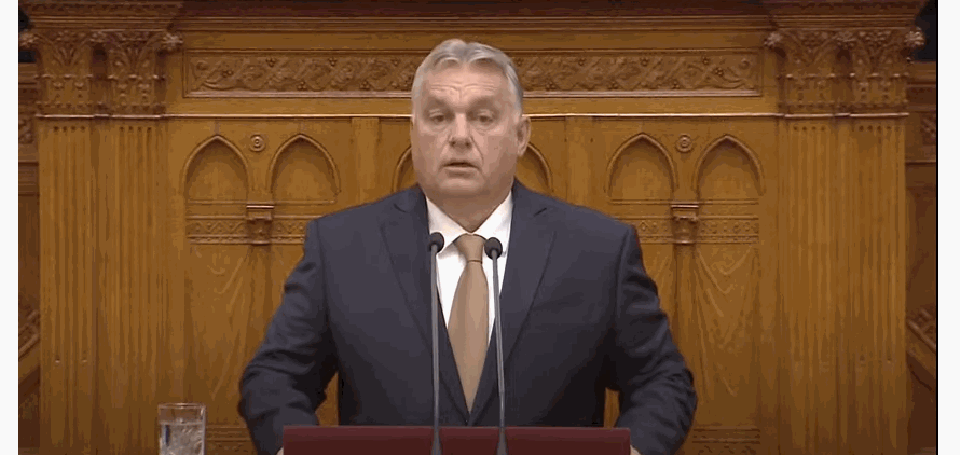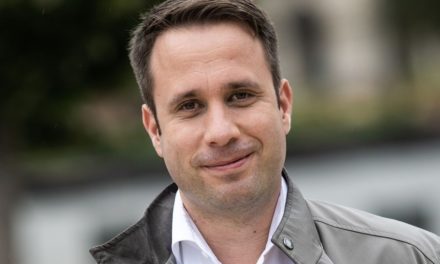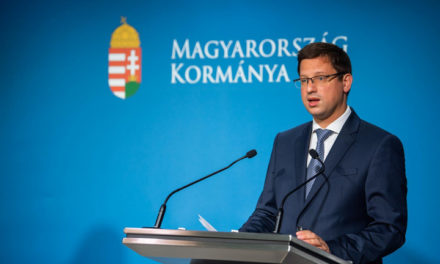"The introduction of sanctions against Russia was not done democratically. It was decided by Brussels bureaucrats and European elites, the European people who pay the price of these sanctions were not consulted. Hungary is now the first in Europe to ask people what they think about these sanctions," Viktor Orbán said in his speech before the agenda. The Prime Minister made it clear that the government's position is that Europe shot itself in the foot with the sanctions, the European people became poorer, and the Russians were not shaken, while this was not what was promised in Brussels in the spring when they decided on the sanctions. And if Brussels persists in the issue of sanctions, the whole of Europe will be involved.
You can read the full transcript of the Prime Minister's speech from the season opening session (you can also watch the video below.)
According to our constitutional customs, I am reporting to you on the government's decisions, which we made between the two sessions. As you know, the countries of Europe have experienced serious and varied changes in recent months due to the drastic increase in energy prices. The world economy is threatened with recession, and the European economy is threatened with collapse. What happens around us now determines our lives even more strongly than usual. Dear House! There's war. The war is taking place in our eastern neighborhood between Ukraine and Russia. Yet, step by step, more and more of the world is becoming a victim of war. A war between Ukraine and Russia would be a local war. However, Western economic sanctions turned it into a global economic war. Therefore, today we are facing a local armed war and a global economic war at the same time. The first question is How long will this war last. In the spring, there were still many who hoped for a short war of a few weeks or months. It is now clear to everyone that we must expect a protracted war. America and the European Union help Ukraine with weapons and money, and Russia's reserves are endless. Both in man and weapon. So we have to prepare for the fact that this war will continue here, in our neighborhood, this year and next. Ukraine is a neighbor of Hungary. Perhaps this is also why Hungary's position differs from the majority Western position. Today, the West is on the side of war, and Hungary is on the side of peace. Instead of continuing and deepening the war, we demand an immediate cease-fire and peace negotiations.
In this global economic war, every country has its own interests. The most important thing for Hungary is the protection of security, economic and national sovereignty. This is why we created a national defense fund in our budget. In addition to the regular budget resources, we must spend on the development of the army, the protection of our borders and the strengthening of the national security services. We will withdraw the soldiers from protecting the southern borders. We created the border hunting units, which will take their place. We are strengthening the national security services so that they are capable of protecting sovereignty in all areas. There are and will be attempts at external influence. There is also a disinformation war going on. The country must also be protected from them.
Dear House! War worries people. But families today are most directly affected by the economic consequences of the war. First and foremost is inflation, the rise in prices. Not only here, but also throughout Europe and the Anglo-Saxon world. Inflation on a scale not seen in forty years is running rampant in developed countries. In some of the countries of the Eurozone, the rate of inflation has already exceeded 20 percent. Like Hungary, the Estonians, Latvians, Lithuanians, Czechs, Bulgarians, Poles, Romanians, Slovenians, Slovaks, Croatians, Greeks, and Spaniards struggle with inflation exceeding the EU rate. All of this affects the countries of Central Europe far above the average. Inflation is the highest in our region, and central banks have started cycles of marked interest rate hikes.
The country's risk premiums have risen significantly, everywhere, the budget deficit is growing and the national debt is increasing. The rate of price increase in our country has also reached a level not seen for decades. This is not the first case, we have seen, I have seen quite a few economic crises. I saw inflation of 35 percent during the Antall government, I saw inflation of over 28 percent under the Horn government, and then, as prime minister, the 1999 Russian and Far Eastern financial crisis. Even the younger ones can remember that in 2008, the financial crisis in Hungary caused headaches all over the world. Those torments were caused by the banking system, indebtedness and foreign currency loans. In addition, we had a disintegrating government in power at the time, which had lost its ability to act. Two years ago, we experienced an economic downturn caused by the epidemic. At that time, jobs were closed due to the epidemic, and borders closing due to the epidemic posed a great threat to an open, export-oriented economy like Hungary. Now in 2022, the cause of the economic problems is the response to the Russian-Ukrainian war, that is, the war sanctions and the energy prices that have risen many times because of them. The increase in energy prices raises inflation in all countries. These harsh energy prices are not triggered by economic processes. The drastic increase in energy prices was clearly caused by the sanctions. Thus, the drastic increase in energy prices is not the responsibility of the economy, but of politics, more precisely the political decisions of Brussels. The price of natural gas in April 2022 in the second month of the war was around 100 euros. Before the Hungarian elections in April, the European position, led by Germany, was that the sanctions should be reasonable. We must not destroy European economies, so the sanctions must not extend to energy. This was a sane position, since sanctions should always be imposed on economic sectors where we are stronger than the one we want to subject to sanctions.
However, in the field of energy, we are dwarfs in Europe, and Russia is a giant. This is the first time I've seen a dwarf sanctioning a giant. Dear Members of Parliament, in April we were right to think that even with a higher energy level, the economic conditions were developing in a predictable manner despite the war. But in June 2022, economic and trade sanctions were accepted in Brussels, including the oil transport sanction. In addition, the natural gas purchase sanction was put on the agenda, so starting in June 2022, the price of natural gas doubled in one month, and then tripled in another month. As you may know, the Brussels rules link the price of electricity with the price of gas. Therefore, the same thing happened in the electricity market. The market price of electricity in Europe was 100 euros on April 22, but today it ranges between 400 and 600 euros. Meanwhile, American gas and electricity prices are a fraction of European prices. Let's talk straight. Today, European countries pay punitive surcharges for oil, natural gas and electricity.
The increase in energy prices also affects food prices. Grain prices are driven up by rising production costs. Fertilizer prices tripled in half a year. Here in Hungary, a 100 percent increase in energy prices stimulates immediate general inflation of between 3 and 5 percent. In other words, today's three- to four-fold increase in energy prices immediately means a price increase of 15-20%. This is what we live in today. Let's say it openly if the sanctions were lifted. Prices would immediately fall in half, and inflation would at least be halved. Without sanctions, the European economy would regain strength and avoid the looming recession. Dear House!
When these sanctions were imposed on Europe in Brussels at the beginning of the summer, that is not what the Brussels bureaucrats promised. They promised that these sanctions would hurt Russia, not the European people. Since then, it has become clear that the introduced sanctions are also causing enormous damage to Europe. Moreover, since the war, i.e. in half a year, Russia has gained 158 billion euros in income from increased energy exports. In half a year, this is more than Russia's 21 entire annual export earnings. In addition, half of this money, 85 billion euros, was paid by the countries of the European Union. It is safe to say that European people have become poorer as a result of the sanctions, and Russia has not fallen on its knees. This weapon backfired, Europe shot itself in the foot with the sanctions. Did the bureaucrats in Brussels in June also promise that the sanctions would bring an end to the war? We still don't see the end of the war today, and energy bills have skyrocketed.
Sanctioned energy prices are difficult for European businesses to manage, or not at all. We are waiting for an answer, the whole of Europe is waiting for an answer from Brussels to the question of how long we will do this. If this continues, all of Europe will be involved. It's time to talk about this honestly with our American friends before it's too late. There are more and more angry people in Europe. We are denial, we are. The bureaucrats in Brussels must understand that it is not possible to gamble with the fate of entire national economies and millions of people. This is irresponsible. And to respond to high energy bills by sending them to Moscow is a hurtful and insulting insult. It is no wonder that people who are angry and feel cheated are replacing the governments of the countries that support the sanctions one after the other. Kudos to Italy, Avanti Ragazzi, but of course that doesn't apply to tonight. Dear fellow representatives!
Hungary has always treated economic sanctions with reservations. We openly represented our concerns in every European forum, even when we were left alone with our opinion. Our arguments were ignored and sanctions were imposed on all countries in Europe. The fashion in Brussels is that they are smarter than everyone else and know everything better there. If they run out of arguments, or if the facts do not justify them, then those who oppose it, such as us, are accused of violating European values. Not very intellectually stimulating.
Moreover, the European treaties place democracy first among European values. And let's be honest, the introduction of sanctions was done in an undemocratic way. Brussels bureaucrats and European elites decided on the sanctions. No one asked the European people. However, the people of Europe will pay the price of the sanctions. It is my personal belief that before sanctions become an irrevocable and long-term part of economic life, we need to get to know people's opinions. That is why we are the first in Europe to ask people's opinions about the sanctions in Hungary. We also did this in the case of migration, the COVID epidemic and gender ideology. We managed to create national unity and thereby created a common basis for crisis management. We are starting a national consultation, where the Hungarian people can express their opinion, whether they agree with the sanctions, whether they support the introduction of new sanctions or not. I ask the Hungarians, everyone to express their opinion. Tell me, because the sanctions affect and will affect the lives of every Hungarian family.
Dear President, dear colleagues. As long as the sanctions are in place and the sanctioned energy crisis continues, Hungary's most important task is to guarantee a secure energy supply. In the face of sanctioned energy prices, we have to protect Hungarian families and jobs as much as we can, but perhaps more than that. I report to the Parliament that the government is able to ensure Hungary's energy supply. In fact, we have already ensured it with our decisions made in the summer. There is enough natural gas, there is electricity, and there is also petroleum. We filled up the gas reservoirs.
We have filled up the gas reservoirs, we have agreed with the Russians on new deliveries, which are constantly arriving in the country. We covered 41 percent of Hungary's annual consumption with the stored gas. We have also solved our petroleum supply. We won an exception to the general Russian oil embargo for the Czechs and Slovaks as well as ourselves. It's a shame that they were nowhere to be seen in the frenzy of the battle in Brussels. And they didn't even say thank you for it. No problem, you're welcome. Dear House! We have our own electricity production, we are able to produce 65 percent of domestic needs, so we have more influence on the price of electricity. However, we need to import 85 percent of natural gas, so we cannot significantly influence its price. Therefore, we have to reduce domestic natural gas consumption. This is what the state, public companies, state institutions and families and businesses must do. I would like to inform the honorable House that, in addition to the exemption from the Brussels oil sanction and the increase in natural gas prices, we made the following decisions during the summer. Natural gas currently accounts for 35 percent of Hungary's energy consumption. We will reduce this to 31 percent by the end of 2023, and bring it below 30 percent by 2025. We ordered the increase of domestic gas production from one and a half billion cubic meters to two billion cubic meters per year. We ordered the restart of the Mátra power plant. We will extend the operating time of the Paks power plant and finally start the construction of Paks 2. The role of the nuclear power plant is unquestionable. It currently provides half of domestic electricity production and 36 percent of domestic consumption. I invite the left-wing parties not to hinder the development of the Hungarian nuclear industry. Moreover, I am asking the left to support the extension of Paks one operating time and the construction of Paks 2. Dear fellow representatives!
The government continues to protect Hungarian families. This year, a total of HUF 1,127 billion remained with families in the form of tax relief and income tax refunds, we paid the 13th monthly pension, we pay an inflationary pension supplement, and we also pay a pension premium at the end of the year. The tax exemption for young people under the age of twenty-five is and will remain in effect. We extended the gasoline price freeze and the food price freeze. We will also extend the interest rate freeze that expires on January 1st until the middle of next year.
I would like to inform the honorable house that the Hungarian government provides the greatest assistance in energy prices in the entire European Union. We maintain the reduced utility prices up to the average consumption, and every Hungarian family saves an average of HUF 181,000 per month. In addition, the price of electricity that households have to pay above average consumption is actually half of the actual market price. We are able to do this because we also have a significant domestic production of electricity. My friends and fellow representatives, in a European comparison, this means that in Germany the energy subsidy is 20 percent of the family's monthly income, in Austria it is 6 percent, and in Hungary it is 30 percent. In other words, the Hungarian subsidy amounts to 36 percent of the average wage, in the case of Germans it is 13 percent, and in Austria it is 5 percent. We generate the money needed to protect families by imposing an extra profit tax on some sectors of the economy. Also for banks, energy companies, telecommunications companies and large retail chains. The amount collected is sufficient for this year's price subsidies, and we have good hopes for the 23rd year as well. In order to replace natural gas, we announced a discounted firewood and brown coal program. In total, we help families with six things. Utility reduced price, firewood program, brown coal program, gas price stop, food price stop and interest stop. In the view of the government, my fellow representatives, helping families is in the first place. But Hungarian businesses follow right after. To fend off high energy prices, all the strength, leadership and talent of the entrepreneurs will be needed. The government provides assistance in three ways. We announced a HUF 200 billion program for productive and energy-intensive small and medium-sized enterprises. We will have a factory rescue program and, if necessary, a new job protection action plan. Dear fellow representatives! If we manage to avoid the energy crisis, then we have to do the same thing that led us to success before. Work-based economy and investment support. Currently, about HUF 9,400 billion, HUF 9,400 billion of public investment is taking place in Hungary. We will carry them through without exception. Due to the uncertain economic situation, we will not start new state investments, because we cannot guarantee that we will be able to complete them. Now we only see resources and opportunities to support job-creating private investments, because we have to put one forint where two more are added. If the European economic situation becomes predictable again, then we will start the currently suspended state investments. Dear House! Due to the sanctioned energy prices, the government updated its medium and long-term energy strategy. Based on Hungary's capabilities, we expect that our country will remain a net oil importer in the long term. Now 59 percent of imports come from Russia, 20 percent from Kazakhstan, eight percent from Iraq and another 8 percent from Croatia. The plan for the complete transformation of our electricity system has also been completed. This includes network development, construction of new power plants, Paks 2 and Paks 1 operating time extension. This represents an investment of 16 billion euros, i.e. 6,400 billion forints, excluding the costs of building Paks 2, and together with that, we are talking about 28.5 billion euros, i.e. 11,400 billion forints worth of development. The huge numbers clearly show that this is the biggest development of the next 10 years. We are implementing a total of 32 large investments. Without these investments, the Hungarian energy system cannot be modernized, and the international competitiveness of the Hungarian economy cannot be ensured. This work must and will be done. The necessary financial resources were promised by the European Union. If the Brussels bureaucrats do not give us the money that belongs to Hungary, then we will obtain the necessary amount from other financial sources. We have started negotiations on this with the European Union and our other international partners. I am informing the honorable house that the government has simplified and accelerated the procedure for investments in solar energy and geothermal-based heat services.
Dear Mr. President, dear colleagues! The program for the complete renewal of the Hungarian energy system remains on the agenda even during the current economic crisis with sanctions, because the government has decided not to give up its national strategic goals during the crisis management period of the next two years. In the next two years, we will continue to develop the transport networks. We will continue our family support programs. Although the number of children born increased, families became stronger and more prosperous, but a breakthrough has not yet been achieved. Time here literally means life. That is why we are expanding family support. At the beginning of December, we will create the final form of the 23rd budget, and new family support measures will appear in it. Likewise, we cannot stop with the program of building a development-based economy either. In addition to the work-based economy, or rather on its basis, we must also build the research and development-based Hungarian economy. The locomotives of this are our reorganized universities, which is why we are continuing our university development program and even accelerating it. We will do the same with our military industry and army construction programs. And, of course, we will also continue our national unification policy. Finally, honorable house, I confirm that, despite our ongoing disputes with Brussels, Hungary still envisions its future as a member of the European Union. We Hungarians are a European nation. We are just as important a part of the community of European nations as any member state. The European Union will only be strong and viable if it retains and respects all its nuances. Those who deny our rights imagine a monochromatic phalanster Europe. We stick to our traditions, national characteristics and our own way of thinking, whether others like it or not. We are a proud nation that is aware that it has always given more to the world than it has received from it. This is our Hungarian contribution to the great joint achievement of the European peoples, which our friends can count on in the future. Dear House! What chances do I see for the months ahead?
Hungary is facing the economic crisis caused by the sanctions today in a better condition than in 2008, when the financial crisis almost destroyed Hungary. Since then, we have created one million new jobs, increased the value of exports by 50 percent and are still capable of economic growth exceeding the European Union average. We have significantly reduced taxes on labor. The personal income tax has been halved since 2010, the rate of the tax wedge has been reduced from 55 percent to 41 percent. Hungary is stronger today than at any time since the fall of communism. The sanctions also cause serious damage to us, but I see a chance for the government to bring Hungary out of this crisis stronger. The government will dictate a strong pace in the coming months. I also entrust my fellow representatives. They will make the most of themselves in the sessions ahead of us. Thank you for your attention. God is above all of us, Hungary above all.
Source: PestiSrácok
Image: Youtube












